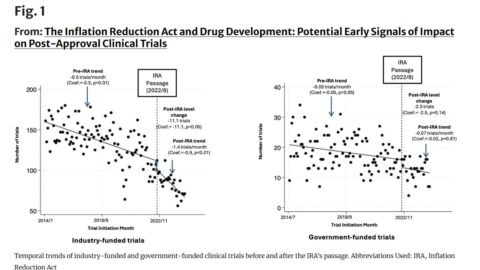If you want to search Cost Curve back issues or link to anything you read here, the web links and archive are online at costcurve.beehiiv.com. You can subscribe there, too.
INFLECTION POINT/ An Eye-Rolling New Survey Makes the Usual Mistake
My first instinct is to ignore this new poll from Arnold Ventures, but it’s probably never wise to ignore things that a billionaire is pushing. We’re going to see that data pop up again and again. (Right now, only The Hill has mentioned it, as far as I can tell, but I fear these numbers won’t just fade away.)
So let me make the case for why you should ignore it.
The survey makes two broad points.
The first is that people hate the pharmaceutical industry (health insurers, too!) and want medicine prices to be lower. This is neither new nor particularly illuminating. I suspect that you could cut medicine prices by 50% tomorrow, and these polling numbers would remain exactly the same.
The reputational baggage here is largely removed from reality. That doesn’t mean that the reputational baggage itself isn’t real, but the solution goes a lot deeper than the poll would like to imply.
The second issue with the poll is that it found that most Americans would rather we have more Medicare price controls. This isn’t new either, but — like nearly every poll on this subject — it’s largely divorced from the question of tradeoffs.
I, too, would like consequence-free price drops, but price controls mean less access and less innovation. And people hate those tradeoffs.
KFF used to ask the “negotiation” questions and — like the Arnold results — people loved the idea of negotiations in theory. But then KFF would throw a curveball and ask if people would support negotiation if they knew it would reduce access, and support just plummeted. When consequences are considered, the whole conversation changes.
Naturally, Arnold didn’t ask about the consequences.
There is a whole polling backstory here. KFF actually stopped asking tradeoff questions about four years ago, instead asking respondents to choose which was more compelling: a pro-pharma statement on drug prices or an anti-pharma one. Not surprisingly, the anti-pharma one “won.” (The Arnold poll used a similar tactic.)
But that approach to polling doesn’t do much to generate insights. It makes the impact on access and innovation into a matter of opinion rather than a fact to be grappled with.
So I don’t find the Arnold poll to be a particularly useful guide to policy changes because respondents aren’t remotely aware of the real tradeoffs undergirding those policies. But the numbers are helpful in another way … underscoring where the knowledge gaps may be.
Like, the tradeoff idea isn’t understood. And that’s an opportunity for education..
QUICK TURNS/ Good News on Gene Therapies, Non-News on Tariffs
A majority of states — 35 — are moving ahead with a CMS Innovation Center pilot designed to help state Medicaid programs secure access to gene therapies for sickle cell disease, per comments by Robert Kennedy, Jr. reported by Bloomberg. It’s nothing but good news that this program is moving forward.
We’re still playing the waiting game on pharma tariffs, which makes pretty much everything you see on the topic fairly speculative. The talker over the weekend was a Reuters story based on a not-publicly-released Ernst & Young analysis that found that there would be $51 billion in costs with the potential to be passed along to consumers. But who eats that $51 billion — the manufacturers? Consumers? The “supply chain”? — remains unresolved.
And here’s a NYT overview of how pharma tariffs might impact European companies. It’s not a bad overview, but — again — no one is working with a lot of facts here.
Cost Curve is produced by Reid Strategic, a consultancy that helps companies and organizations in life sciences communicate more clearly and more loudly about issues of value, access, and pricing. We offer a range of services, from strategic planning to tactical execution, designed to shatter the complexity that hampers constructive conversations.
To learn more about how Reid Strategic can help you, email Brian Reid at brian@reidstrategic.com.





